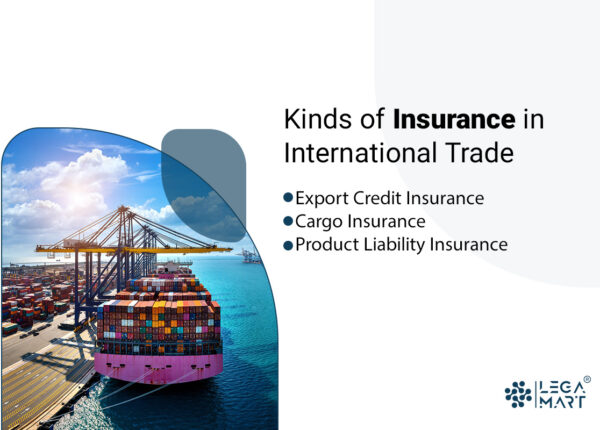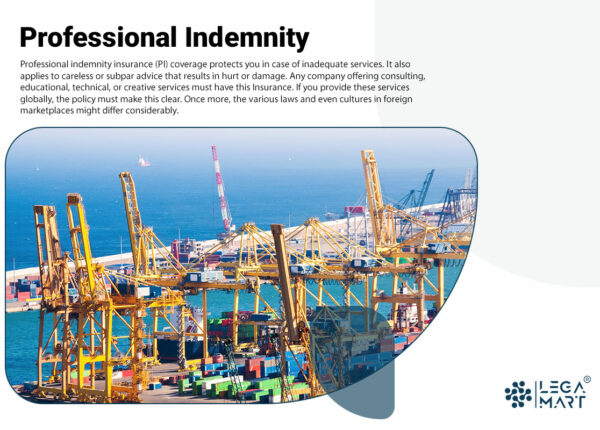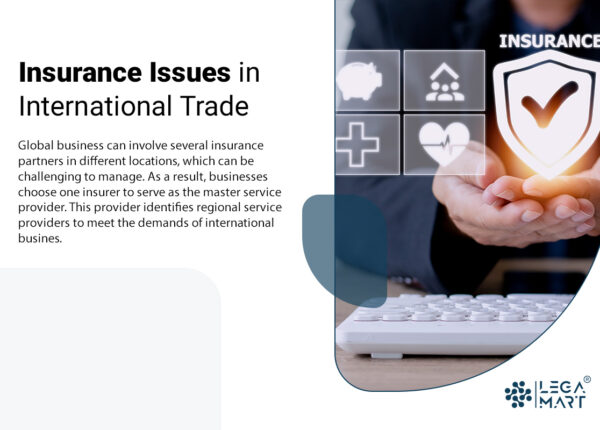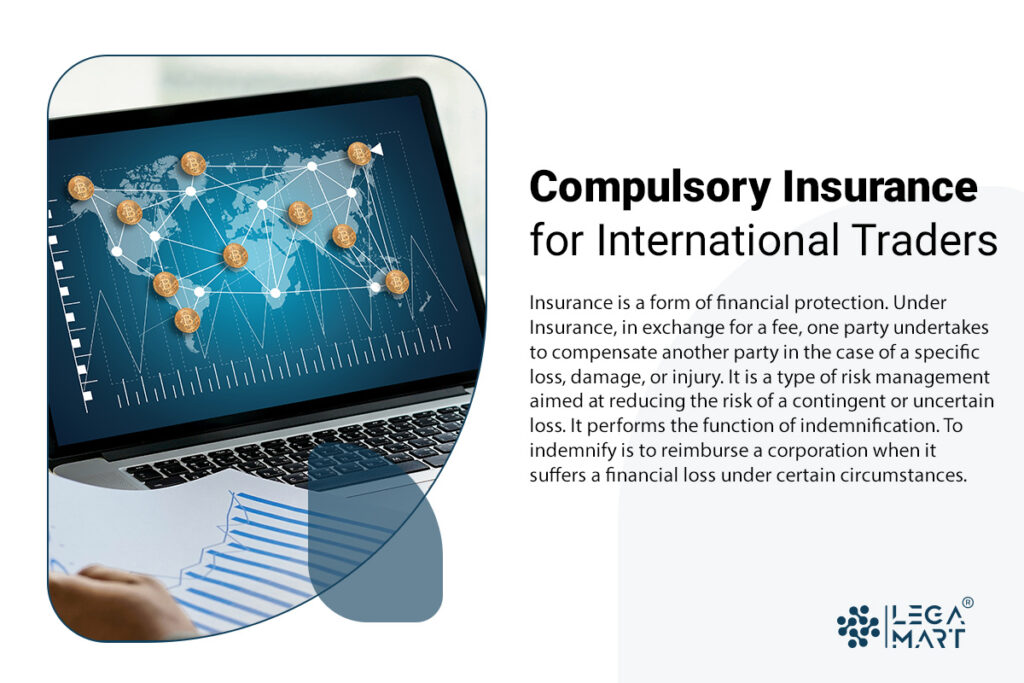Introduction
Insurance is a form of financial protection. Under Insurance, in exchange for a fee, one party undertakes to compensate another party in the case of a specific loss, damage, or injury. It is a type of risk management aimed at reducing the risk of a contingent or uncertain loss. It performs the function of indemnification. To indemnify is to reimburse a corporation when it suffers a financial loss under certain circumstances.
The insurance industry benefits significantly from a strong economy with a thriving export business that allows it to reach clients worldwide.
In collaboration with governments, banks, and financial intermediaries, insurance companies create solutions. Governments even mandate compulsory Insurance for international traders to assure business certainty and stability. These solutions promote worldwide sales. Insurers use their expertise in foreign markets to mitigate some of the risks faced by novice exporters.
Under international trade, insurance claim protects importers and exporters against various damages. These include damaged commodities in transit, items that harm customers, and non-payment by importers. Insurance companies assume some of the risks. It further helps exporters to capitalize on the possibilities of expanding enterprises into other markets.
Kinds of Insurance in International Trade

Insurance companies occasionally create new international trade insurance products. For instance, foreign currency exchange insurance. Some are compulsory Insurance for international traders, while others are discretionary.Further, choosing discretionary insurance depends upon the type of business to protect them against future liabilities. However, the most common forms of insurance used to aid commerce are the following:
Export Credit Insurance
Exporters can provide flexible credit conditions to importers thanks to export credit insurance. The Insurance offers defense against importer non-payment. It will pay out most of the amount of a defaulted receivable. The Insurance eliminates the risk associated with the credit extension. It is subject to the condition that the exporter has the assets and cash flow to safely float merchandise to the importer with a promise of payment that may not happen for up to 180 days.
Cargo Insurance
International commerce insurance that covers goods in transit is cargo insurance. Cargo Insurance coverage is available to both importers and exporters. The terms of the sales contract typically govern contract clauses. This kind of Insurance protects against total loss and damage sustained during transportation. It also indemnifies harm that may occur while the items remain in the country’s customs facilities. Potential outcomes, such as confiscation and articles opened during inspections, are also addressed when commodities reach a foreign jurisdiction.
Product Liability Insurance
The other popular kind of Insurance for foreign trade is coverage for product liability. As the name implies, this Insurance safeguards you if your products result in property loss, damage, or harm to third parties. If this occurs, you can be liable in a lawsuit for damages. Protection against this risk, including fees and liabilities, is provided by product liability.
Product liability insurance is required if you make or assemble a product. You still need it even if you only supply goods that a third party manufactures or even if you develop the product. Diverse nations have different legal systems. Some will apply strict responsibility for harm or damage brought on by defective products. Even if you didn’t manufacture it, you might still be accountable as the provider (including online sales).
Professional Indemnity

Professional indemnity insurance (PI) coverage protects you in case of inadequate services. It also applies to careless or subpar advice that results in hurt or damage. Any company offering consulting, educational, technical, or creative services must have this Insurance. If you provide these services globally, the policy must make this clear. Once more, the various laws and even cultures in foreign marketplaces might differ considerably.
Compulsory Insurance for International Traders
An insurance policy that a person or organization is legally obligated to purchase is compulsory Insurance for international traders. For instance, for those who engage in financially hazardous activities, countries mandate Insurance. These also include operating a vehicle industry or running a business with workers.
The kind and complexity of the desired goods and services will determine the insurance needs and certificates of insurance required by an export business. The World Bank Group’s individual country insurance requirements matrix lists the specific insurance requirements for each nation. LegaMart experts also consistently advised on country-wise requirements for compulsory Insurance for international traders.
The United States and Canada have a greater risk of litigation and larger claim payouts. Hence, product liability and professional indemnity premiums are expensive there. As a result of the enormous volume of legal activity that these markets attract, exporting there may result in much higher premiums. It is so that insurers can control the amount of risk they take.
Nearly all companies with workers in the UK are required by law to have employer liability insurance. It includes your legal responsibility to employees for harm, disease, or death incurred while conducting business. Even if you might not have workers stationed abroad permanently, exporting may need your UK staff to travel abroad for work.
Insurance Issues in International Trade

Challenges faced by international traders regarding insurance include:
- Global business can involve several insurance partners in different locations, which can be challenging to manage. As a result, businesses choose one insurer to serve as the master service provider. This provider identifies regional service providers to meet the demands of international busines.
- The insurance industry is strictly regulated around the world. However, this law varies from one location to another and is not uniform. Different jurisdictions have different norms for compulsory Insurance for international traders. Due to the numerous legal distinctions make offering a uniform insurance policy challenging.
- The jurisdiction of the contract expressly states that in the insurance contract. Consequently, the contract specifies the exact court or arbitrator to be consulted if a dispute arises. When master service providers work with several local service providers, issues occur. The ultimate consequence is an enormously tangled network of contracts. There is potential for more conflicts. It is also difficult to pinpoint the precise jurisdiction of these contracts.
- When managing claims from abroad, communication is also essential. Adequate user training must be provided to a local insurance agent. When an insurance-related occurrence happens, they should know what to anticipate and who to call. Additionally, they must be fully aware of the documentation requirements. They must also train on loss prevention strategies to follow.
Significance of Insurance in International Trade
An insurance policy provides financial assistance and lessens the uncertainty people and companies encounter. It offers the best risk-mitigation strategy against situations. This way, it avoids people and enterprises in difficult financial situations. Legamart experts have also strongly advised the use of Insurance in international trade through a reputable insurance company. Protecting a business against organizational and economic instability is essential. The competitive global economy of the modern world includes trade and commerce insurance.
Trade credit insurance solutions protect businesses against instability and customer bankruptcy. Trade insurer enables firms to set up a high-quality risk management system. Supplier, customer, and business partner lawsuits can expose companies to dangers, including bankruptcy. These risks can be mitigated by liability insurance if a stakeholder sues the firm.
Conclusion
Every business has risks. Several insurance options are available to shield them from financial loss in various situations. There is a provision for Insurance for almost anything. It would be expensive, and you could be paying for Insurance you don’t need or are unlikely to use. Yet, insuring against everything would undoubtedly lessen risk. On the other hand, inadequate coverage can be devastating, particularly in a risky industry like international trading.
Compulsory Insurance for international traders mainly includes product liability, cargo insurance cover for goods, professional indemnity, and export credit liability. Several countries have laid down the requirements for compulsory Insurance for international traders. It varies from country to country. International traders also face several challenges. Challenges include international jurisdictions, multiple contracts, and communication issues. There is a lot of significance for international trade. It mitigates risk, ensures stability, and improves compliance.





